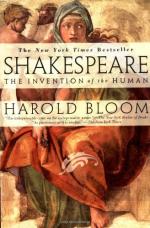
|
| Name: _________________________ | Period: ___________________ |
This test consists of 15 multiple choice questions and 5 short answer questions.
Multiple Choice Questions
1. Who whom does Bloom compare Beatrice and Benedick from "Much Ado About Nothing"?
(a) Regan and Goneril in "King Lear".
(b) "Romeo and Juliet".
(c) The lovers in "Love's Labor's Lost".
(d) Orlando and Rosalind in "As You Like It".
2. How does Shakespeare use "As You Like It" to comment on his own politics?
(a) He uses allusions to Marlowe's death to assert his political cautiousness.
(b) He cites Marlowe's political bravery as the reason for his outrageous dramas.
(c) He implores Marlowe to forgive him for trying to survive in trying times.
(d) He uses his characters to lament his political timidity.
3. Who does Viola end up with in "Twelfth Night"?
(a) Cesario.
(b) Orsini.
(c) Olivia.
(d) Malvolio.
4. To whom does Bloom characterize Rosalind in "As You Like It"?
(a) Hamlet.
(b) Beatrice.
(c) Iago.
(d) Othello.
5. How does Bloom characterize Caesar?
(a) A caricature.
(b) A sacrificial character.
(c) A real person.
(d) A larger-than-life figure.
6. What play does Bloom say "Henry VI" resembles?
(a) The Tempest.
(b) Tamberlaine the Great.
(c) 'Tis Pity She's a Whore.
(d) Doctor Faustus.
7. In what way does Bloom say Shakespeare departs from Marlowe's precursor "The Jew of Malta"?
(a) The Jew is more monstrous.
(b) The play is more overtly anti-Semitic.
(c) The Jews are more caricaturist.
(d) The Christians are as vicious as the Jew.
8. How is Joan of Arc depicted in "Henry VI", in Bloom's account?
(a) As a saint.
(b) As a whore/heroine.
(c) As a maternal figure.
(d) As a sly, manipulative woman.
9. What does Bloom say is the relationship between "The Merchant of Venice" and "The Jew of Malta"?
(a) An inversion.
(b) A reaction formation.
(c) A transference.
(d) A turning away.
10. Whom do Antipholus and Dromio discover when they arrive in Ephesus, in "Comedy of Errors"?
(a) Their long lost twins.
(b) Their master.
(c) Their servants.
(d) Their wives.
11. What charge does Bloom defend the faeries in "Midsummer Night's Dream" from?
(a) That they are archetypes.
(b) That they are proto-human.
(c) That they are arbitrary.
(d) That they are super-human.
12. How does the play resolve the tension between Oberon and Titania?
(a) They negotiate peace.
(b) They depart.
(c) They die.
(d) They reconcile.
13. How does Bloom characterize Faulconbridge?
(a) As the first of the renaissance men in Shakespeare's plays.
(b) As the last Marlowe-type character in Shakespeare.
(c) As the first Shakespearean character.
(d) As the most Shakespearean character in Shakespeare's plays.
14. How does Bloom characterize "Much Ado About Nothing"?
(a) Shakespeare's most perfect play.
(b) A Biblical comedy.
(c) A disorganized jumble.
(d) Nietzschean.
15. What does T. S. Eliot say overwhelms "Romeo and Juliet"?
(a) The tragic ending.
(b) The conservatism of the feuding families.
(c) The improbability of the deaths.
(d) The power of the love between Romeo and Juliet.
Short Answer Questions
1. What did Shakespeare create with pain, in Bloom's interpretation?
2. Who is the center of the subplot in "Twelfth Night"?
3. What song reminds Bloom of this other work?
4. What doe G. K. Chesterton say Rosalind is seeking in the woods?
5. Who claims that Shakespeare invented the human personality?
|
This section contains 495 words (approx. 2 pages at 300 words per page) |

|




